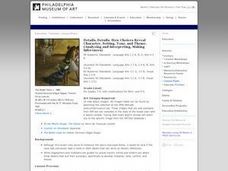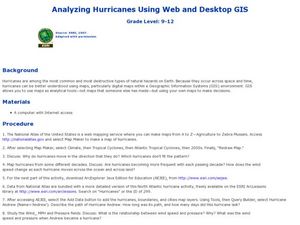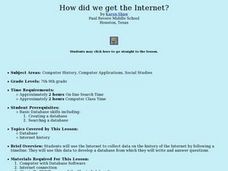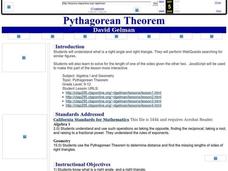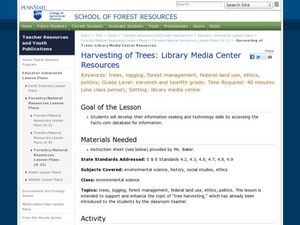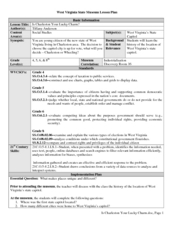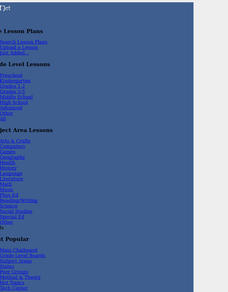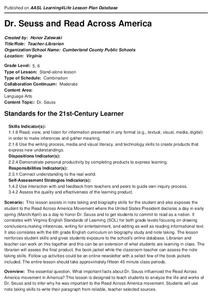Curated OER
Details, Details: How Choices Reveal Character, Setting, Tone, and Theme. (Analyzing and Interpreting, Making Inferences)
Students respond to works of art. In this art interpretation instructional activity, students examine images of art while using concepts they learned as they read literary pieces. They detail the setting, characters, and the mood and...
Curated OER
At Your Service
Students discuss various volunteer activities and read how New York City organizes its volunteer efforts. They create their own databases compiling volunteer opportunities and write reflective essays on how volunteers help their...
Curated OER
What is Matter?
Students investigate what matter is and how it changes states. In this physical properties lesson, students examine the vocabulary database and identify the characteristics of the three phases of matter. Students perform a...
Curated OER
My Community
First graders design a Powerpoint presentation to reflect information about their community. In this community lesson, 1st graders create slides to explain the weather, geography and other information about the city.
Curated OER
Analyzing Hurricanes Using Web and Desktop GIS
Learners analyze hurricanes. In hurricanes lesson, students use the Internet and GIS to analyze hurricanes. Learners view the National Atlas of Maps to discuss the direction hurricanes move. Students study the wind and pressure fields to...
Curated OER
It's All Greek to Me!
While the ideas for Ancient Greek research are solid, there is little detail to help make your job easier. The focus here is familiarizing your class with online databases and print resources in their school library. After direct...
Curated OER
How Did We Get the Internet?
Students research online to find answers to complete History of the Internet chart, collect data on history of Internet by following timeline, and use data to develop database from which they write and answer questions using word processor.
Curated OER
The Countries of Slave Trade
Students create graphs, routes, and write an essay based on their research of the slave trade. In this slave trade lesson plan, students research the Middle Passage and how slave trade happened in the United States.
Curated OER
Pythagorean Theorem
Students identify a right angle and right triangle. They perform WebQuests searching for similar figures and solve for the length of one of the sides given the other two.
Curated OER
The Dynamic Earth
Students use the Internet to investigate earthquakes and plate tectonics. For this plate tectonics lesson, students complete a web quest with multiple links and activity types relating to earthquakes and volcanoes. They connect the...
Curated OER
Bill Irwin: All in a Day's Work
Young scholars perform for an audience. In this performing arts lesson, students explore the work of actor Bill Irwin in a variety of roles. Young scholars direct and perform a fairy tale in small groups .
Curated OER
Harvesting of Trees: Library Media Center Resources
Students research harvesting of trees in the United States and write a summary. For this informative lesson students state whether they agree or disagree with an article and write a summary on why.
Curated OER
The Civil War - Reading on the Internet
Students fill out a KWL worksheet and answer short answer questions about the Civil War. In this Civil War lesson plans, students find the answers to their questions by researching the Internet.
Curated OER
Catalog Display for the Novel : The Family Under the Bridge by Natalie Carlson
Fourth graders explain the novel through creative descriptions, learn importance of word choice in descriptive writing, and implement technology skills of searching the Internet, typing, cutting and pasting, graphic designs, and...
Curated OER
On the Edge and Under the Gun
Young scholars brainstorm ideas related to gun control and share with the class. in this gun control activity, students research teacher approved websites related to gun control. Young scholars write a paper in groups on a self selected...
Curated OER
What Makes you Hot?
Students manipulate different variables in a model and make inferences about the temperature on Earth. In this heat lesson students calculate the blackbody radiation of an object at a certain temperature.
Curated OER
Researching Ancient Greece
Sixth graders engage in a lesson that is concerned with the civilization of Ancient Greece. They conduct research using a variety of resources and use the information to construct an organized computer generated document for class...
Curated OER
Is Charleston Your Lucky Charm?
Students determine what makes Charleston, West Virginia unique. In this West Virginia history instructional activity, students explore the West Virginia History Museum to identify why Charleston became the capitol of the state.
Curated OER
Quilt Codes
Students list criteria to evaluate credible historical sources and defend their criteria in an essay. In this historical sources lesson plan, students review information of historical sources as well as the facts and pictures.
Curated OER
The Research Paper - Searching for a Subject
Students research a website to look for potential topics for a research paper. They develop a narrowed prioritized subject list on an index card (3X5) using word processing program.
Curated OER
Phenomenology Lesson Plan #4: Character Part 1
Students examine the way they react to characters and text. They write respones to different media tests. They are required to bring in a photograph and create a mini-biography for homework.
PBS
1000 Words
A picture really can speak a thousand words—no matter how old! Scholars become history detectives as they learn how to analyze historical photos and evidence to uncover the past. The fun hands-on activity makes history come alive through...
Curated OER
Dr. Seuss and Read Across America
What important facts about Dr. Seuss influenced the Read Across America movement...? This is the driving question of a research project that requires scholars to find information about Dr. Seuss' life and work. Class...
Curated OER
Regions of the United States
Fifth graders collect data about regions of the United States using the Internet, library books, and encyclopedias. They write an essay persuading people to visit their state.
